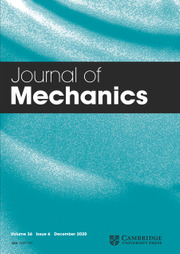Article contents
Modal Analysis and Dynamic Behavior for Analytical Drivetrain Model
Published online by Cambridge University Press: 15 May 2017
Abstract
A generalized dynamic model for an automotive drive train system was detailed to investigate its modal properties and dynamic behavior. The model's engine excitation, clutch, gearbox and disc brake were presented. Then, vibration modes were obtained and classified into clutch, transmission system, disc brake, bearing and combined modes. For each vibration mode, the kinetic and strain modal energies distributions were studied. The dynamic equations were resolved using the numerical Newmark method. The dynamic behavior of the bearings and transmission errors for the two gear stages were studied, and, the effect of the disc brake parameters on the transmission error was analyzed. Finally, a frequency sweep analysis was studied to investigate the system resonance problem.
- Type
- Research Article
- Information
- Copyright
- Copyright © The Society of Theoretical and Applied Mechanics 2018
References
- 6
- Cited by


